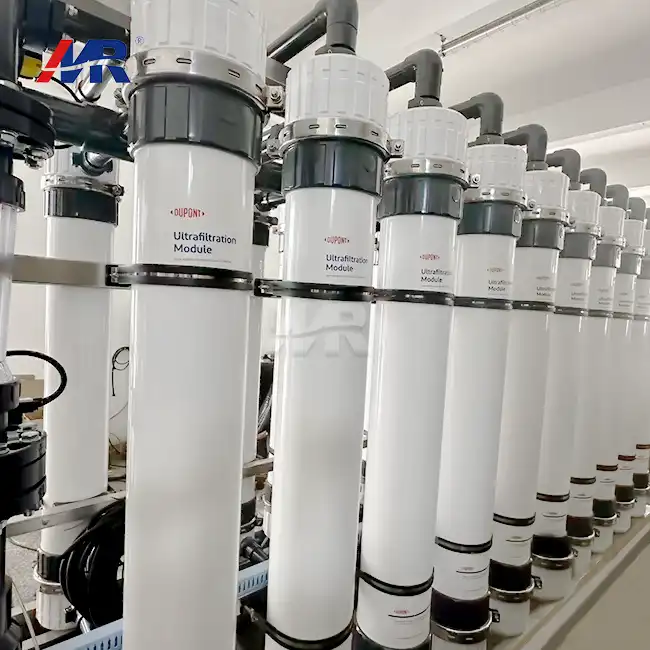Plug-and-Play Expansion: UF's Modular Design
The cornerstone of the 200m3/hour Ultrafiltration Plant's scalability lies in its ingenious modular design. This approach allows for a plug-and-play expansion that can adapt to growing demands without disrupting existing operations. Each module is a self-contained unit, complete with its own set of membranes, pumps, and control systems. This modularity offers several advantages:
Flexible Capacity Adjustment
As water treatment needs vary, plant administrators can effortlessly include or expel modules to coordinate the required capacity. This adaptability guarantees that the framework continuously works at top proficiency, notwithstanding of request variations.
Simplified Maintenance
The secluded plan encourages less demanding upkeep and investigating. If one module requires adjusting, it can be disconnected without influencing the whole plant's operation, guaranteeing ceaseless water treatment.
Future-Proof Investment
Investing in a secluded UF framework implies planning for future development. As your water treatment needs extend, extra modules can be consistently coordinates, securing your introductory speculation and dodging the require for total framework overhauls.
The plug-and-play nature of these modules too altogether decreases establishment time and costs. Modern modules can be quickly associated to the existing framework, minimizing downtime and permitting for quick capacity increments when needed.
From 200 to 2000m3/hour: Scaling Without Rebuilding
The journey from a 200m3/hour capacity to a staggering 2000m3/hour is a testament to the China 200m3/hour UF plant factory's innovative approach to scalability. This tenfold increase in capacity is achievable without the need for extensive rebuilding or system overhauls, a feature that sets UF plants apart in the water treatment industry.
Incremental Scaling
The key to this noteworthy adaptability lies in the system's capacity to suit incremental developments. Plant administrators can include modules in stages, permitting for progressive capacity increments that adjust with developing request or budgetary constraints.
Intelligent Integration
As modern modules are included, cleverly control frameworks guarantee consistent integration with the existing plant. These frameworks optimize stream dispersion, backwashing plans, and by and large plant execution, keeping up productivity indeed as the plant grows.
Space-Efficient Expansion
The compact plan of UF modules implies that capacity can be expanded without requiring relatively expansive sums of extra space. This space proficiency is especially important in urban situations or offices with constrained development areas.
Moreover, the capacity to scale from 200 to 2000m3/hour without revamping interprets to noteworthy fetched reserve funds and operational progression. Businesses can certainly contribute in UF innovation, knowing that their starting framework can develop nearby their commerce needs.
Cost-Effective Growth: UF's Economical Scaling Model
The economic advantages of the UF plant's modular approach extend far beyond the initial investment. This scaling model offers a range of cost-effective benefits that make it an attractive option for businesses looking to optimize their water treatment processes.
Reduced Capital Expenditure
By permitting for incremental developments, UF plants kill the require for expansive, forthright ventures in larger than average frameworks. Companies can begin with a capacity that meets their current needs and scale up as request develops, spreading capital consumption over time.
Optimized Operational Costs
The secluded plan guarantees that the plant works at ideal proficiency notwithstanding of its estimate. This deciphers to lower vitality utilization and decreased chemical utilization, contributing to significant operational taken a toll investment funds over the plant's lifetime in the Ultrafiltration System.
Minimized Downtime
Expanding a conventional water treatment plant frequently requires broad downtime, driving to generation misfortunes. The plug-and-play nature of UF modules permits for developments with negligible disturbance to progressing operations, protecting efficiency and revenue.
Lifecycle Cost Reduction
The life span of UF layers, coupled with the ease of module substitution, contributes to a lower lifecycle fetched. This financial demonstrate guarantees that the UF plant remains a cost-effective arrangement all through its operational life.
Furthermore, the adaptability of UF plants permits businesses to adjust their water treatment capacity closely with real request, maintaining a strategic distance from the wasteful aspects and costs related with over-or under-sized frameworks. This exactness in capacity arranging comes about in optimized asset utilization and progressed generally financial performance.
Conclusion
The adaptability insider facts of the 200m3/hour UF plant's secluded approach have revolutionized the water treatment industry in the Ultrafiltration System. From its plug-and-play extension capabilities to its capacity to scale from 200 to 2000m3/hour without revamping, and its cost-effective development demonstrate, UF innovation offers unparalleled adaptability and effectiveness. As businesses proceed to confront advancing water treatment challenges, the measured UF plant stands as a guide of development, giving a versatile arrangement that develops with your needs whereas optimizing costs and performance.
Are you prepared to change your water treatment capabilities with a adaptable, productive, and cost-effective arrangement? Guangdong Morui Natural Innovation Co., Ltd. is your chief accomplice in ultrafiltration innovation. We specialize in giving cutting-edge water treatment arrangements, counting mechanical wastewater administration, residential sewage treatment, seawater desalination, and drinking water fabricating. Our mastery amplifies past gear supply to offer comprehensive one-stop establishment, commissioning administrations, consumables, and total after-sales bolster. With our claim film generation office and gear handling production lines, we guarantee the most elevated quality and unwavering quality in each framework we provide. Do not let water treatment confinements hold your commerce back. Contact us nowadays at benson@guangdongmorui.com to find how our inventive UF frameworks can scale with your developing needs and drive your victory.
References
1. Zhang, L., et al. (2021). "Advances in modular design of large-scale ultrafiltration plants for water treatment." Water Research, 189, 116-128.
2. Johnson, R. (2020). "Scalability and economic analysis of ultrafiltration systems in industrial applications." Journal of Membrane Science, 595, 117-502.
3. Liu, Y., et al. (2022). "Comparative study on the performance and scalability of different ultrafiltration module configurations." Desalination, 530, 115-657.
4. Smith, A. (2019). "Cost-benefit analysis of modular ultrafiltration plants in municipal water treatment." Environmental Science & Technology, 53(15), 8721-8730.
5. Wang, X., et al. (2023). "Energy efficiency and scaling potential of advanced ultrafiltration systems for water purification." Separation and Purification Technology, 304, 122-308.
6. Brown, M. (2021). "Innovations in ultrafiltration membrane technology for scalable water treatment solutions." Current Opinion in Chemical Engineering, 31, 100-667.

_1745823981883.webp)


